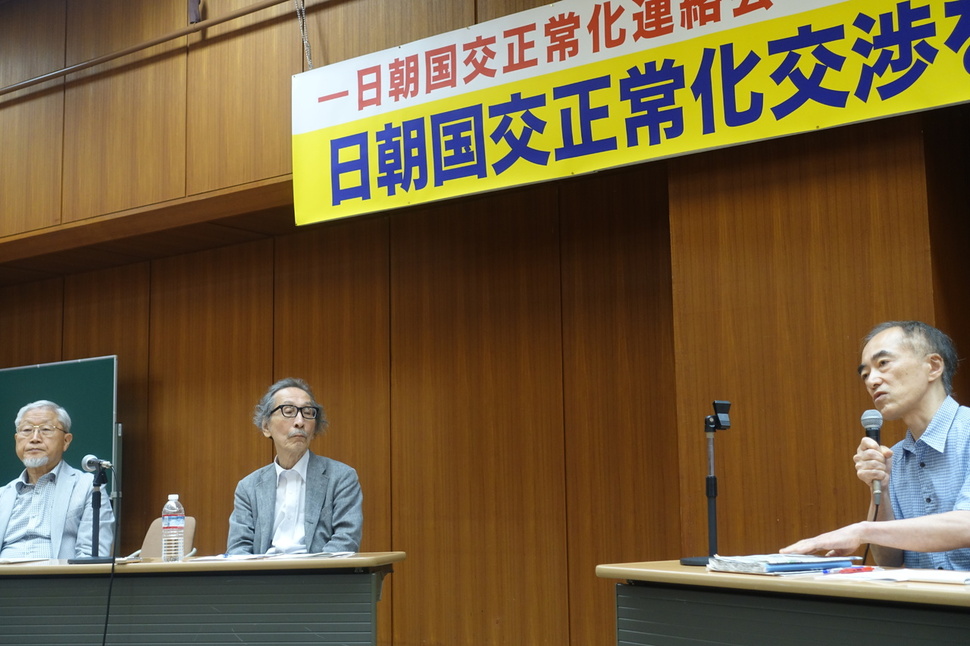 |
|
Haruki Wada (center), professor emeritus at Tokyo University, partakes in a debate session titled, “Resume Negotiations about Normalizing Japan’s Diplomatic Relations with North Korea” on June 25.
|
Yohei Kono acknowledges Japan’s colonial rule is original cause behind Korean division
Since the June 12 North Korea-US summit, some Japanese have been arguing that the issue of Japanese nationals abducted by North Korea should be put on the back burner so that diplomatic relations with North Korea can be normalized or so that the normalization of diplomatic relations can be negotiated while the two sides work on resolving the abductee issue. The first person to openly voice this argument – which has not been easy to make given the rightward shift of Japanese society – was Yohei Kono, former chief cabinet secretary and the architect of the 1993 Kono Statement, which acknowledged the compulsory nature of the recruitment of the comfort women and the Japanese imperial army’s involvement in their recruitment. “This can’t be fixed by simply demanding the return [of the abductees] from a country with which we have not even resolved the issue of our colonial rule. The proper order is to establish bilateral relations and then to bring home [the abductees],” Kono said during a lecture in Tokyo on June 13. “Japan’s colonial rule of Korea is one of the original causes of the division of the peninsula into North and South. Japan, South Korea and North Korea must declare that they will create a denuclearized region and renounce the possession of nuclear weapons. That’s the kind of ideals they should hold,” he said. The author of such potentially explosive remarks happens to be the father of Japanese Foreign Minister Taro Kono. Professor Haruki Wada recommends Abe forfeits his three principles “In order to normalize diplomatic relations, Abe will have to give up his three principles about the abductees,” said Haruki Wada, professor emeritus at Tokyo University in a debate titled “Resume Negotiations about Normalizing Japan’s Diplomatic Relations with North Korea” on June 25. Wada has been a long-standing advocate of normalizing the two countries’ diplomatic relations. Prime Minister Shinzo Abe, who came to power thanks in part to a hardline stance on the abductee issue, has held to the following three principles on the abductee issue: that the abductee issue is the most important challenge for Japan, that diplomatic relations cannot be normalized without resolving this issue; and that the campaign to repatriate the abductees presumes that all the victims are still alive. “I don’t deny that the abductee issue is an important challenge, but it’s not right to call it the most important challenge. That’s nothing more than a political performance by Abe, who became prime minister after gaining attention over the abductee issue,” Wada said. After noting that former Prime Minister Junichiro Koizumi had tried to resolve the abductee issue while moving forward with normalizing diplomatic ties with the Pyongyang Declaration in 2002, Wada advocated working on these two issues at the same time. There are quite a few Japanese experts who are critical of Abe’s three principles on the abductee issue, which they describe as being too ambitious and therefore impracticable. “We must be stern in our negotiations with North Korea. Such remarks undermine our bargaining position, and it’s very disappointing that such a veteran politician would make them,” Abe said during an interview with the press following Kono’s remarks. By Cho Ki-weon, Tokyo correspondent Please direct comments or questions to [english@hani.co.kr]






